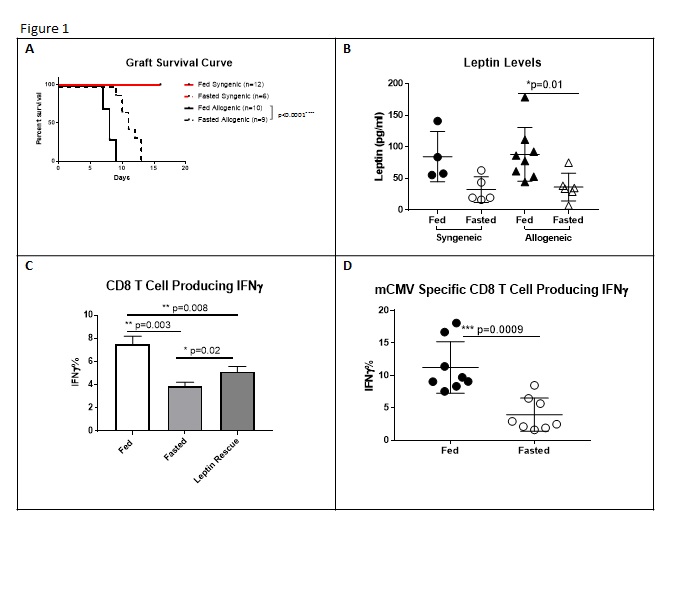Undernutrition and Leptin Deficiency Modulates T Cell Immunity in Transplantation
1Pediatrics, Duke University, Durham, NC, 2Surgery, Duke University, Durham, NC
Meeting: 2019 American Transplant Congress
Abstract number: 156
Keywords: Cytomeglovirus, Graft survival, Lymphocytes, Weight
Session Information
Session Name: Concurrent Session: Lymphocyte Biology - Basic
Session Type: Concurrent Session
Date: Sunday, June 2, 2019
Session Time: 4:30pm-6:00pm
 Presentation Time: 5:18pm-5:30pm
Presentation Time: 5:18pm-5:30pm
Location: Room 306
*Purpose: We have previously shown an association between undernutrition and the development of viremia in transplanted children. While undernutrition is associated with impaired T cell immunity and leptin deficiency in non-immunosuppressed children, the mechanism in transplanted pediatric recipients is unknown. We aimed to determine how undernutrition impacts T cell immunity using a murine skin transplantation model.
*Methods: Fed and fasted C57BL/6 mice received skin grafts from either syngeneic or Balb/C (allogenic) donors. Graft survival was monitored, spleens were harvested for T cell flow cytometry analysis at Day 5, and serum was analyzed for leptin levels with ELISA at Day 2. Additional C57BL/6 mice were inoculated with murine cytomegalovirus (mCMV) and fasted for 48 hours, an established surrogate for undernutrition, or fed ad libitum. Mouse spleens were harvested at Day 5, stimulated in vitro with mCMV viral peptide, and T cell function examined by flow cytometry. Viral titers were quantified by mCMV qPCR.
*Results: Fasted C57BL/6 mice had prolonged skin allograft survival p<0.0001 (Fig 1A). Leptin levels were also significantly decreased in fasted compared to fed mice, p=0.01 (Fig 1B). Furthermore, the frequency of IFNγ producing CD8 T cells was lower in fasted mice (p=0.003), and the addition of leptin during fasting increased relative frequencies of these CD8 T cells, p=0.02 (Fig 1C). As undernutrition can be immunosuppressive, T-cell specific mCMV viral responses were examined. Fasted mice had increased viral burden 209030 ± 49367 compared to fed mice 44859 ± 11902, p=0.005 and had impaired mCMV-specific T cell responses compared to fed mice, p=0.0009 (Figure 1D).
*Conclusions: Undernutrition affects cytotoxic and effector T cell memory responses leading to prolonged allograft survival, while also impairing mCMV T cell-specific immunity. Signaling through the leptin pathway may modulate CD8 T cell responses, giving insight into the mechanism by which undernutrition decreases T cell alloreactivity, at the expense of impairing viral-specific T cell immunity and predisposing transplanted children to viremia.
To cite this abstract in AMA style:
David E, Zhu M, Bennett B, Cheng D, Nichols A, Parker W, Schroder P, McIver N, Kirk A, Chambers E. Undernutrition and Leptin Deficiency Modulates T Cell Immunity in Transplantation [abstract]. Am J Transplant. 2019; 19 (suppl 3). https://atcmeetingabstracts.com/abstract/undernutrition-and-leptin-deficiency-modulates-t-cell-immunity-in-transplantation/. Accessed February 15, 2026.« Back to 2019 American Transplant Congress

